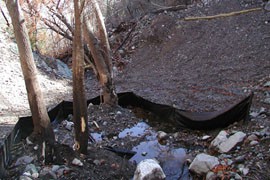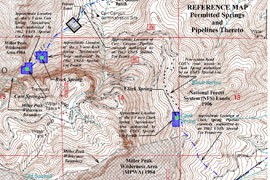Cronkite News has moved to a new home at cronkitenews.azpbs.org. Use this site to search archives from 2011 to May 2015. You can search the new site for current stories.
Tombstone water war takes a break so ‘shovel brigade’ can fix pipeline
WASHINGTON – The U.S. Forest Service has issued special permits for the city of Tombstone to fix sections of its water line system, which was heavily damaged in last year’s wildfires.
The permits, issued Thursday, allow the volunteer Tombstone Shovel Brigade to go in to the Miller Peak Wilderness Area and use shovels, saws and other hand tools until 8 p.m. Saturday to work on as many as two of the springs that feed the water lines.
Tombstone City Manager George Barnes said it’s not a lot of time, but without the repairs one of the springs has a 90 percent chance of being washed away during the approaching monsoon season. The spring is currently patched with PVC piping and sandbags.
“If we can protect this water line with what we’ve got, then that’s wonderful,” Barnes said of the weekend’s repairs.
The repairs mark a temporary reprieve in the water war between the city and the Forest Service, and they come as a House committee heard testimony on a bill Friday that would prohibit federal agencies from blocking emergency water repairs.
The city has been asking for permission for months to take heavy equipment on federal lands where the springs are located so they could fix the lines, which were damaged in the rains following last year’s wildfires.
The government has approved some work but has been balking at other proposals over the scope of the work, saying the law required it to get more detail from the city before it could allow work to proceed. The dispute led to a lawsuit by the city and congressional proposals to allow the city to proceed.
Coronado National Forest Supervisor Jim Upchurch said Friday that the Forest Service is willing to work with the city as it continues to make repairs on the water line.
“We’re really happy with the relationship with the city and we think there’s some positive things going forward,” Upchurch said. “We’ll continue to work with them if they need additional maintenance needs that require permits.”
Barnes said shovel brigade workers face a “hard, two-mile hike” to reach the Gardner Spring, with temperatures expected to approach 100 this weekend. ˜He said the group plans on reinforcing the spring and diverting its flow using boulders, sand, downed trees and flood debris.
As of Friday morning, nearly 100 volunteers had shown up to help with preliminary work and Barnes said organizers expect as many as 200 people to head out with shovels and hand tools on Saturday.
In Washington, meanwhile, Rep. Jeff Flake, R-Mesa, testified Friday that his “Emergency Water Supply Restoration Act” would help not only Tombstone, but also other communities who experience similar situations in the future.
“We should be able to get the water source to where it was before, and that that trumps everything else,” he said in testimony to a House Natural Resources subcommittee. “The health and safety of the citizens is paramount.”
But Paul J. Spitler, director wilderness policy for the Wilderness Society, testified that the bill would, in effect, be “jeopardizing the health and safety of downstream water users, and undermining water law throughout the United States.”
He said in remarks prepared for the committee that the Clean Water Act, Safe Drinking Water Act, Wilderness Act and “dozens of other laws that protect Americans’ health and safety or natural environment” would not be enforceable during states of emergency if the bill came into action.
Gov. Jan Brewer declared a state of emergency in Tombstone in August because of the water-supply problems.








